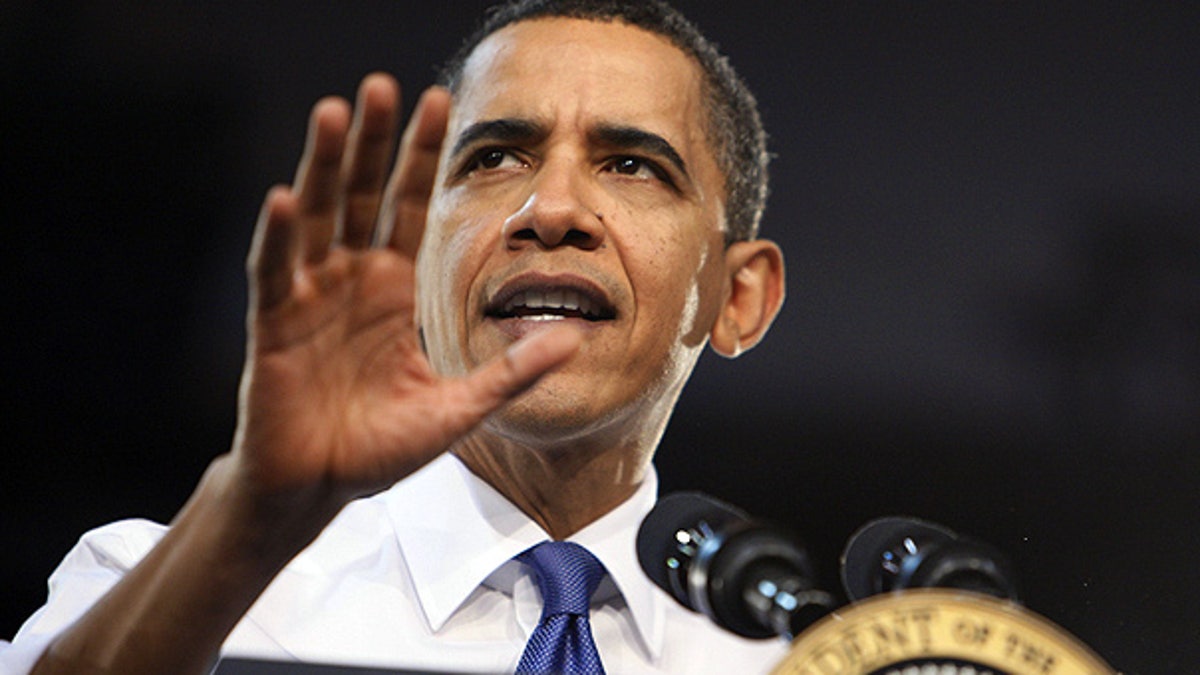
Mar. 8: President Obama speaks about health care reform at Arcadia University in Glenside, Pa. (AP)
WASHINGTON -- President Barack Obama has chosen a suburban St. Louis high school to make his closing argument for a health care overhaul, pushing a new anti-fraud plan as he cranks up the pressure on skittish Democratic lawmakers to act fast.
Obama is to speak Wednesday at St. Charles High School, his second health care address in three days. His speech comes as congressional Democrats stand on the brink of delivering the president a success with passage of his sweeping overhaul legislation -- or a colossal failure if they can't get it done.
Business groups that oppose the legislation are also stepping it up, with the U.S. Chamber of Commerce announcing a coordinated campaign to spend as much as $10 million on ads, starting Wednesday, saying, "Stop this health care bill we can't afford."
Leaders in the House and Senate are waiting for a final cost analysis from the Congressional Budget Office in the next day or so that will allow them to start counting votes -- and twisting arms -- in earnest. In the House, in particular, getting the needed majority will be touch and go.
The two-step approach now being pursued calls for the House to approve a Senate-passed bill from last year, despite House Democrats' opposition to several of its provisions. Both chambers then would follow by approving a companion measure to make changes in that first bill.
White House press secretary Robert Gibbs has said he expects the House to act by March 18, the day Obama leaves for an overseas trip. That timetable would be tough to meet, and congressional leaders told White House Chief of Staff Rahm Emanuel that they don't need deadlines handed down from the White House, according to Rep. Henry Waxman, D-Calif., who chairs the Energy and Commerce Committee.
"He was certainly informed that we don't feel that we want any deadline assigned to us," Waxman said.
Republicans are playing on House Democrats' suspicions of their Senate colleagues, arguing that Senate Democrats may not hold up their end of the bargain and the votes will be damaging politically for Democrats in November.
"They will be voting, when they pass the Senate bill, to endorse the Cornhusker kickback, the Louisiana Purchase, the Gator-aid, the closed-door deal," Senate Minority Leader Mitch McConnell, R-Ky., said, citing controversial elements of the Senate bill.
An Associated Press-GfK Poll released Tuesday found a widespread hunger for improvements to the health care system, but also found that Americans don't like the way the debate is playing out in Washington.
About four in five Americans say it's important that any health care plan have support from both parties. And more than three in five say the president and congressional Democrats should keep trying to cut a deal with Republicans rather than pass a bill with no GOP support.
Leaders of both parties in Congress say that's not how it's going to work out. After a year of off-and-on negotiations, Republicans adamantly oppose Obama's plans. The White House and Democratic leaders say it's now-or-never for a health care overhaul, which would cover an additional 30 million Americans, require almost everyone to buy health insurance and impose new restrictions on insurance companies.
The president is applying pressure from the outside. In a speech Monday in Pennsylvania, he railed against insurance companies. The message for his Wednesday afternoon speech is aimed directly at the political middle. The plan he's touting would bring in high-tech bounty hunters to help root out health care fraud, a populist idea with bipartisan backing.
Waste and fraud are pervasive problems for Medicare and Medicaid, the giant government health insurance programs for seniors and low-income people. Improper payments totaled an estimated $54 billion in 2009. They range from simple errors such as duplicate billing to elaborate schemes operated by fraudsters peddling everything from wheelchairs to hospice care.
The bounty hunters in this case would be private auditors armed with sophisticated computer programs to scan Medicare and Medicaid billing data for patterns of bogus claims. The auditors would get to keep part of any funds they recover. The White House said a Medicare pilot program recouped $900 million for taxpayers from 2005-08.
A presidential memorandum Obama will sign Wednesday directs Cabinet secretaries and agency heads to intensify their use of private auditors under current legal authority.
The White House estimates that expanded use of private audits throughout the government could recoup at least $2 billion for taxpayers over three years.











































